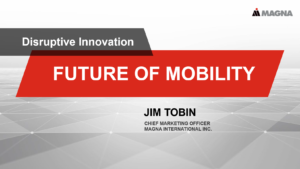Jim Tobin: Driving the Future of Michigan Mobility Requires Collaboration
March 27, 2019Speaking from 39 years of experience, Tobin told attendees that the automotive and mobility industry is the most complex.
“As we go forward, there is going to be exponential change,” he said.
From automation to electrification and beyond, the industry is rife with potential technological growth, but the question remains: when are these innovations going to hit the mainstream?
Tobin said, not for a while. In the midst of disruption, the industry should also consider factors such as affordability and infrastructure. He stressed the importance of collaboration between various sectors —government, industry, and academia.
“The value of partnerships to pool resources and knowledge to attack challenges is critical.”
According to Tobin, by 2030 there will be an estimated 70 million vehicles with electrified powertrain and the market size will increase to approximately $80-95 billion. With this projected boom in the industry, Michigan can be a leader by leveraging great automotive minds, pooling resources for better alignment, and appointing an auto czar — or advocate — in Lansing.
The next 10 years will be critical for Michigan, said Tobin, and education is a key factor that will drive Michigan’s automotive and mobility needle.
“We need to create awareness early enough in life that children know that there are opportunities in the auto industry.”
Tobin said drawing the next-generation talent pool includes changing the conversation from “college-ready to career-ready,” connecting with students from K-9, including basic hand tools training in the education system, and allowing high school students to enter pre-apprenticeship programs.
The factories of the future will also work to upskill employees in their current plants. It’s not enough to just pay attention to technology; the industry must analyze how the existing infrastructure will handle what’s going to happen down the road.
“How can we use MichAuto to make sure the state of Michigan is the go-to moving forward,” Tobin said. “No one company is going to do it on their own. We need communication, coordination, and cooperation. Where do we want to take this industry?”

